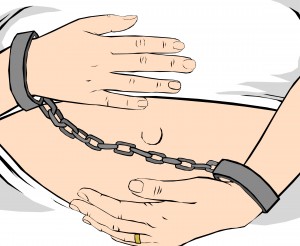
Women in several states have been arrested and tried for manslaughter, assault with a deadly weapon or child abuse – all because they had miscarriages.
Police and prosecutors in these states argue the drugs these women used while pregnant caused their miscarriages. The trend is disturbing, worrying and completely insane.
The knee-jerk desire to punish someone for harming an unborn child is understandable and universal. However, stretching existing laws to punish women, and only women, for having miscarriages that most likely were out of their control is medieval, paranoid, backward and counterproductive in the long run.
Anywhere between 15 and 25 percent of pregnancies will end in a miscarriage. The most common cause of miscarriage is chromosomal abnormalities in the fetus, which account for about 70 percent of miscarriages.
It’s true that drugs and alcohol abuse can have horrible effects on a fetus, but it’s a two-way street. Even though a father’s use of drugs or alcohol during conception has been linked to Sudden Infant Death Syndrome, lower birth weight, birth defects, heart defects, brain damage and various cancers once the baby is born, only women have been tried for any crimes against unborn children because of their substance abuse. There’s a major double standard against women at work here.
Everyone knows drinking and smoking can harm a developing fetus. Every bottle of wine and pack of cigarettes reminds us.
However, caffeine, shellfish, processed meat and litter boxes can do the same thing. Some studies even suggest working in the dental field could pose a threat.
With so many possible causes, it’s incredibly reckless to label addicted women criminals.
If a woman is living with an addiction and afraid to seek help because she will be treated like a criminal, everyone loses. She may not seek out treatment for her addiction because she doesn’t want to be charged with child abuse or endangerment. She may even opt out of medical treatment for fear of her addiction being discovered, which would prove dangerous for everyone involved. For instance, some drugs might not cause a miscarriage on their own, but untreated withdrawal from the drug may be violent enough to trigger a miscarriage.
Once the baby is born, quite possibly with physical deformities or mental retardation, the mother could be arrested anyway and charged with a crime whose definition was stretched egregiously to apply to her.
At its core, this response is a reflection of outdated, misogynistic, simplified ideas about parenthood, gender roles, morality and addiction.
Any form of addiction should be treated like the disease it is. Instead of oversimplifying the problem, several states have developed drug treatment programs specifically for pregnant women, which is a much saner response. Prosecuting addicts for getting pregnant will only hurt everyone involved, including the children these prosecutors claim they are trying to protect.
























